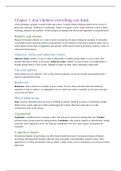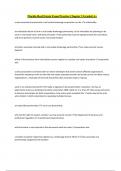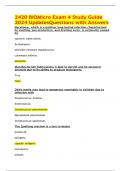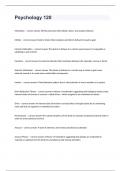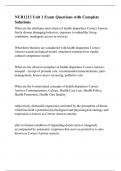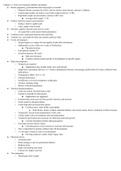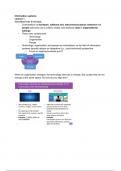Critical thinking: rationally evaluate beliefs and actions. Consider whether thinking abides by the criteria of
good sense and logic. Feedback or commentary. Helps us recognize a scam. About minimum criteria of good
reasoning, obstacles and mistakes. Avoid making or accepting weak and invalid arguments or being distracted.
Beliefs and claims
Purpose of thinking critically is to come to correct conclusions. Evaluate thinking by standards of rationality.
Concluding involves believing. Belief is propositional: can be expressed in declarative sentence (either true or
false). Beliefs are the same as judgements and opinions. When express belief in declarative sentence, result is a
statement/claim/assertion.
Objective claims and subjective claims
Objective claim: whether it is true or false is independent of whether people think it is true or false. Also
possible that truth or falsity is not known. Subjective claim: whether it is true or false is not independent of
whether people think it is true or false. Depends on what you think. Many statements contain both.
Fact and opinion
Some opinions are not subjective. Not so that all factual opinions are all true. Factual opinion/belief/claim =
objective opinion/belief/claim.
Relativism
Relativism: truth is relative to standards of given culture. If your culture and some other have different
standards of truth or evidence, no independent view by which one culture’s standards can be seen to be more
correct than the others.
Moral subjectivism
Issue: question. Determine what the issue is. Difficult to identify, might be no point in considering it further.
Hard to know exactly what sort of data would support the remark. Must have some idea as to what
considerations bear on the answer.
Arguments
Arguments: consideration for accepting a claim. One part gives reason for accepting other part. Premise:
provides reason, giving reason for taking position. Conclusion: what premise supports or demonstrates, stating
a position. Some arguments can be very long and complicated. Not every issue requires an argument for
resolution.
Cognitive biases
Unconscious features of psychology can affect human mental processes. Unconscious features of human
psychology affecting belief formation that have been reasonably well established: cognitive biases. Skew
apprehension of reality and interfere with our ability to think clearly, process information accurately and reason
objectively.
, Belief bias: tendency to evaluate reasoning by the believability of its conclusion.
Confirmation bias: tendency to attach more weight to evidence that supports our viewpoint.
Heuristics: general rules we unconsciously follow in estimating probabilities.
Availability heuristic: unconsciously assigning probability to a type of event on the basis of how
often one thinks of events of that type. Generalizing from anecdote: when accepting sweeping
generalization based on single vivid report.
False consensus effect: assume our attitudes and those held by people around us are shared by society
at large.
Bandwagon effect: unconscious tendency to align thinking with that of others. Potentially powerful
source of cognitive distortion (Asch).
Negativity bias: weight negative information more heavily than positive information when evaluating
things.
Loss aversion: more strongly motivated to avoid a loss than to accrue a gain.
In-group bias: easier to form negative opinions of people who don’t belong to our group.
Fundamental attribution error: not appreciate that others’ behavior is as much constrained by events
and circumstances as our own.
Robber’s Cave Experiment. People make snap judgements about who is/is not a member of their group.
Milgram: obedience to authority. Overconfidence effect: estimate amount of correct answers on the high
side. Better-than-average illusion: most of a group rate themselves as better than most of the group. Even
when informed.
Truth and knowledge
Truth: objective claim/belief is either true or false in the normal, commonsense way. Knowledge: you believe,
you have justification in the form of an argument beyond reasonable doubt, no reason to suspect you are
mistaken.
What critical thinking can and can’t do
We think critically when we evaluate the reasoning we and others use in coming to conclusions. Critical
thinking anywhere can be waylaid. Helps spot bad reasoning.
Chapter 3: clear thinking, critical thinking and clear
writing
Gobbledygook: pretentious or unintelligible jargon designed as much to bewilder as to inform. Causes of
obscurity: excessive vagueness, ambiguity, excessive generality and undefined terms.
Vagueness
Vague: cannot say with certainty what it includes and excludes. Plays important role in everything we do, s.a.
law. Sometimes it can be annoying, s.a. with vague instructions. Often intentionally used to avoid giving a
clear, precise answer. Occurs in varying degrees, impossible to get rid of entirely. Problems arise when there is
too much vagueness. Level not acceptable when appropriately useful information can't be conveyed.
, Ambiguity
Ambiguous: has more than one meaning. Can have consequences, s.a. in discussion of gay rights. Ambiguity
of term ‘rights’.
Semantic ambiguity
Semantic ambiguity: claim containing ambiguous word or phrase. Can be made unambiguous by substitution.
Grouping ambiguity
Special kind of semantic. Grouping ambiguity: not clear whether word is being used to refer to a group or to
members of it individually. Can be used intentionally to interfere with clear thinking.
Syntactic ambiguity
Syntactic ambiguity: claim is open to two or more interpretations because of its structure. The word ‘only’ is
both useful and easy to use incorrectly. Ambiguity from modifying phrase that is not clear in application.
Ambiguous pronoun references: not clear to what or whom pronoun is supposed to refer.
Generality
Generality: lack of specificity. F.ex.: term that refers to all members of group is more general than about fewer
members. Difference between very general description and one with more specificity can be crucial to nearly
any decision.
Defining terms
Clarity and distinctness and careful definition of terms. Applies to important issues.
Purposes of definitions
Lexical definitions: like those in dictionaries, what a word ordinarily means. Precising or stipulative
definitions: designed to make term more precise or stipulate new or different meaning from ordinary one.
Stipulating: in this … the term … will refer exclusively to …. Persuasive or rhetorical definitions: to
persuade or slant someone’s attitude or point of view toward whatever the defined term refers to. Often distorts
the real meaning of a term in order to cause the listener or reader to favor or disfavor a person, policy, object or
event. Frequently make use of the emotive meaning of the rhetorical force of words.
Kinds of definitions
Definition by example/ostensive definition: identifying one or more examples of the sort of thing to
which the term applies
Definition by synonym: giving another word or phrase that means the same
Analytical definition: specifying the features a thing must possess in order for the term being defined
to apply to it, genus-and-species classification


